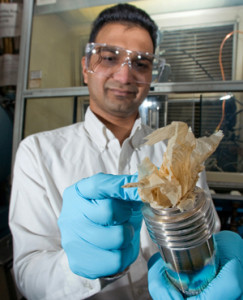
Vilas Pol has assisted in the discovery of a nanoparticle network that could bring fast-charging batteries. He joined the Society in 2012.
Credit: Argonne National Laboratory
The Electrochemical Society’s Vilas Pol, along with a team of Purdue University researchers, has developed a nanoparticle network that could produce very fast-charging batteries.
This new electrode design for lithium-ion batteries has been shown to potentially reduce the charging time from hours to minutes, all by replacing the conventional graphite electrode with a network of tin-oxide nanoparticles.
This from Purdue University:
The researchers have performed experiments with a “porous interconnected” tin-oxide based anode, which has nearly twice the theoretical charging capacity of graphite. The researchers demonstrated that the experimental anode can be charged in 30 minutes and still have a capacity of 430 milliamp hours per gram (mAh g−1), which is greater than the theoretical maximum capacity for graphite when charged slowly over 10 hours.
“We are not using any sophisticated chemistry here,” Pol said. “This is very straightforward rapid ‘cooking’ of a metal-organic precursor in boiling water. The precursor compound is a solid tin alkoxide – a material analogous to cost-efficient and broadly available titanium alkoxides. It will certainly become fully affordable in the perspective of broad scale application mentioned by collaborators Vadim G. Kessler and Gulaim A. Seisenbaeva from the Swedish University of Agricultural Sciences.”
Pol has been a member of ECS since 2012 and is an active member of the Battery Division.
Make sure to read more of Pol’s research in battery technology in ECS’s Digital Library, and join him and other brilliant scientific minds by becoming a member of ECS today!

